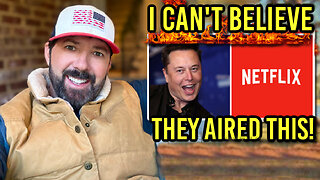Premium Only Content

When Progressive Ideology Clashes with Reality
This week, a scene worthy of political parody went viral on social media: a person with green-dyed hair, theatrical makeup, half-grown facial hair, and a victimhood-centered speech uploaded a video literally complaining about having a police car parked in their neighborhood. Not because they were unjustly arrested, nor because they witnessed police brutality. No. Their outrage is… that a police officer lives nearby and parks their work vehicle in their own driveway.
The comment was so ridiculous that conservative Twitter user Todd Spears didn’t hesitate to mock it, calling the person “Transanardo, the transgender ninja turtle,” referencing both their aesthetics and the absurdity of the speech. Of course, the tweet sparked outrage among progressives—and laughter among those who still have common sense.
But beyond the mockery, this episode reveals something far deeper: the chasm between concrete reality and an ideology that insists on reinterpreting the world through paranoia, victimhood, and social engineering.
The New Enemy? A Cop at Home With His Patrol Car
The protagonist of the video starts with a solemn tone, as if about to deliver a major exposé. “I’ve had this thought going around in my head for months…” they say. What follows is almost tragicomic: “One of the easiest things we could eliminate would be not allowing officers to take their vehicles home.” Their argument? That seeing a police car parked outside “intimidates” neighbors and represents a symbol of the so-called “police state” that the United States has supposedly become.
Beyond the hyperbole, the complaint is absurd from every angle. Since when is a worker taking their work vehicle home a sign of oppression? If a cable technician can park their van in front of their house, why can’t an officer do the same?
The answer is simple: in the progressive mind, the police aren’t a profession—they are an ideological threat. It doesn’t matter if the officer is part of the neighborhood, pays taxes, protects the area during their shift, or has never committed any abuse. For armchair activists, seeing a patrol car is “symbolic violence.”
The Real Problem Isn’t the Police Car—It’s the Disconnect from Reality
This kind of discourse doesn’t arise from rational analysis, but from a sick narrative in which everything traditional—everything that represents order, law, authority, or structure—must be dismantled. Today it’s the police car. Tomorrow it will be the national anthem. The day after that, the fences around children’s playgrounds for being “oppressive.”
It’s reached the point where a citizen can no longer feel safe because a patrol car is nearby. Now, they must feel oppressed. Unsafe. Threatened. And not by the officer’s actions, but by their mere existence.
Instead of being grateful for police presence in the area—something many neighborhoods would love to have—the protagonist of the video turns a symbol of security into a conspiracy theory. It’s the height of self-victimization: when you no longer have real abuses to report, you have to invent them.
When “Activism” Turns Into Comedy
The most alarming part is that this kind of content isn’t an exception. It’s become the norm within the most radical corners of progressivism—people who confuse discomfort with violence, presence with oppression, and authority with fascism.
And when someone—like Todd Spears—dares to point out the absurdity, they are accused of transphobia, intolerance, or hate speech. But the real question is: isn’t it more hateful to attack someone who risks their life every day to protect us? Isn’t it more intolerant to demand that police officers hide—just because their presence reminds some people that rules exist?
In this game of victimhood, no one is allowed to be normal. If a cop lives on your street, they’re not a neighbor—they’re a threat. If you have a different opinion, you’re not a dissenter—you’re an enemy. And if you make jokes about the absurd—you’re not a critic, you’re a “fascist.”
The Hypocrisy of Cardboard Progressivism
This double standard is now a pattern. The same people who ask for “inclusion” can’t tolerate the presence of a police car. Those who say they want “safe spaces” turn their neighborhoods into zones of paranoia. The ones who complain about being “invisible” won’t stop monopolizing public discourse with their performative laments.
And this is where Republicans must raise our voice. Not just to mock—though sometimes it’s inevitable—but to remind everyone that safety, order, and respect for the law are non-negotiable. We’re not going to hide our police officers. We’re not going to apologize for their existence. And we’re not going to let the country’s stability be held hostage by the tantrum of a minority that turns everything into an ideological drama.
Conclusion: Sanity Still Has Value
While some people get offended by the sight of a patrol car, others are thankful it’s there. While some cry into a camera about feeling “intimidated,” others head out every day to patrol, face crime, and protect families.
And while progressives keep spiraling into victimhood and delusion, millions of Americans—gay, straight, religious, atheist, male, female, trans or not—continue to believe in a country where common sense is not a crime, and where being a police officer is not a shame, but an honor.
Because at the end of the day, the one who needs therapy isn’t the cop.
It’s the one who’s scared… because of where he parks his car.
-
 LIVE
LIVE
TimcastIRL
43 minutes agoNEW Epstein Emails Drop, Dems Claim TRUMP KNEW, Congress Forces Epstein Release Vote | Timcast IRL
16,776 watching -

Glenn Greenwald
3 hours agoMAGA Outrage Over Trump's Plan for More H-1B Visas: With Prof. Ron Hira; Latest Epstein/Israel Revelations and Newly Released Emails: With Drop Site's Murtaza Hussain | SYSTEM UPDATE #546
26.3K21 -
 LIVE
LIVE
TheSaltyCracker
1 hour agoDem's Epstein Drop Backfires ReeEEStream 11-12-25
9,697 watching -
 LIVE
LIVE
Barry Cunningham
3 hours agoBREAKING: PRESIDENT TRUMP DINNER | GOVERNMENT SHUTDOWN VOTE | MAHA SUMMIT WITH RFKJR & JD VANCE!
1,249 watching -
 5:23
5:23
Buddy Brown
6 hours ago $0.49 earnedElon, Out Here Doin the LORD'S WORK! | Buddy Brown
5884 -
 1:01:44
1:01:44
BonginoReport
3 hours agoWhat Do Newly Released Epstein Emails Prove? - Nightly Scroll w/ Hayley Caronia (Ep.176)
94.8K46 -
 LIVE
LIVE
The Jimmy Dore Show
2 hours agoPastors PAID To Slander Tucker & Candace! Trump IRATE Over New Epstein Emails! w/ Elijah Schaffer
8,603 watching -
 LIVE
LIVE
LFA TV
23 hours agoLIVE & BREAKING NEWS! | WEDNESDAY 11/12/25
705 watching -
 8:14
8:14
Jamesons Travels
8 hours agoGreen Beret Stopped Playing It Safe & Went AMERICA FIRST
9097 -
 1:24:36
1:24:36
Kim Iversen
4 hours agoTrump Spent “Hours” With Epstein Victim — Possibly Blackmailed
84.2K122